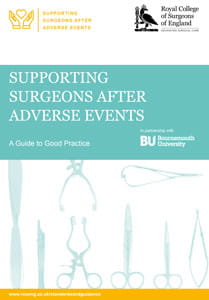Supporting surgeons after adverse events
Get involved: Our SUPPORT Improvement Collaborative is aimed at improving the support systems provided to surgeons after adverse events. We're recruiting trusts and health boards to be a part of this unique new initiative. Learn more about SUPPORT and contact us to register.

Brief description
Adverse events such as surgical errors and complications are an inevitable part of a surgeon’s life. When something goes wrong in surgery, the impact on surgeons and members of the surgical team can be profound and can directly affect their personal and professional wellbeing, including their health. The Royal College of Surgeons of England, in collaboration with the Bournemouth University surgical wellbeing research team, has developed guidance to help prepare surgeons for when things go wrong, and to support them when they do.
This guidance is based on extensive research carried out by Bournemouth University trying to understand the extent of the impact on surgeons by adverse events and the type of interventions that can support them, build resilience and enhance psychological flexibility.
Who is this guide for?
The guidance is for surgeons and members of the wider surgical team seeking advice after an adverse event or wishing to be prepared. The guidance also looks at the roles and responsibilities of medical managers.
Existing data suggests that surgeons are poor users of mental health support services and as a group are susceptible to suicidal ideation and significant levels of distress and burnout. It is therefore important that the needs of surgeons are specifically addressed.
What can I learn from this guide?
The guidance provides advice and tools to mitigate the impact of adverse events on surgeons and surgical teams. It looks at multiple aspects of the response to adverse events with a central focus on surgical wellbeing. Areas covered include:
- organisational culture and preparedness;
- roles and responsibilities of senior clinicians and managers;
- medicolegal aspects, and most importantly;
- the immediate ‘first aid’ support of an involved surgeon.
Download Supporting Surgeons after Adverse Events
Read the guide online
Further resources
- Our SUPPORT Improvement Collaborative, a unique initiative aimed at improving the support systems provided to surgeons after adverse events across the UK, was designed to help implement this guidance into mainstream surgical practice.
- For a wider discussion on the emotional and professional impact of adverse events, please listen to an episode from our podcast on failing intelligently.

